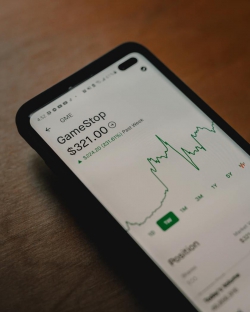How one BYU professor predicted the GameStop stock bubble 13 years ago, and what he says is next
PROVO, Utah – Feb 12, 2021 – Recent headlines have been buzzing with news of an unpredictable stock market thanks to the recent surge of GameStop share price. By now the story is widely understood — after several wealthy hedge funds bet on the video game retailer to decrease in value, a band of investors came together through a Reddit forum to drive the price of the stock up nearly 1,500%, an act surprising millions of Americans and leaving many to wonder where the market will go.
But for Bill Tayler, the Robert J. Smith Professor and Associate Director of BYU's School of Accountancy, the stock market surge wasn't surprising at all. Tayler predicted a stock market saga like this in a research paper published in The Review of Financial Studies in 2008.
In the following interview, Tayler explains what happened and what he thinks will come next.
Q: The surge in the stock price of GameStop has captured the attention of the country. For those unfamiliar with the stock market, can you explain the GameStop situation?
A: Because GameStop is a bricks-and-mortar retail store, its primary revenue model has struggled for the past several years. With this in mind, several large hedge funds predicted the investment value of GameStop to go down. A projected decrease in value means two things for investors; they can choose not to buy the stock, or they can short sell the stock.
Q: Can you explain what a short sale is?
A: A short sale occurs when investors sell stock they don't own because they believe the price of the stock will fall. When the price drops, they can buy back the stock and return it to the lender at a lower price and make a profit.
To simplify, here's an analogy: Imagine your friend has a book currently being sold for $10. You have a hunch that the book isn't worth $10 and instead will soon only be worth $5. You ask your friend if you can borrow the book and your friend loans it to you. Then, you decide to sell the book for $10. In two weeks, your hunch is realized, and the book has decreased in value and is being sold for $5. You buy the book back for $5 and return it to the friend who loaned it to you originally. You just made a profit of $5 without using any of your own money.
The risk comes if the book’s value doesn't decrease to $5 and instead goes up in value to $20. When it's time to return the book to your friend (this is called a margin call in the stock market), you have to spend $20 to return the book (this is called a short squeeze).
In the case of GameStop, amateur investors discovered large hedge funds were short selling GameStop stock and decided to band together in an attempt to "stick it" to the wealthy investors. On a forum named WallStreetBets on the social media platform Reddit, these amateurs jointly decided to purchase a high amount of GameStop shares. Their efforts drove up the price of the stock, quickly resulting in margin calls and short squeezes for investors.
Q: You were part of a research team predicting something such as this could happen in the stock market 13 years ago. How did you predict this?
A: When I was at Cornell University my colleagues and I wanted to understand why smart investors wouldn't bet against a bubble. We had just seen the tech bubble expand and then crash in 2000 and 2001. We found it strange to see such bubbles expand despite smart investors knowing it was a bubble.
We gathered groups of participants and asked them to trade shares of an artificial company in a simplified stock market. Each participant was told that one trader in the market was a computerized "robot trader" who would buy shares continuously, causing the price of shares to go up. Traders could choose to do nothing, or they could try to make money by short selling shares (which were overpriced) or by buying shares and frontrunning the bubble the robot trader was creating.
During the early rounds of trading, a few participants tried short selling, but most participants bought shares. They knew the price would keep going up because of the robot trader, so they might as well try to buy low early and sell high later. This strategy caused a short squeeze on the sellers who had to unwind their short position and buy back stock at inflated prices. That caused the price to rise more, leading to huge price bubbles.
At the end of trading, there was a massive sell-off as participants tried to get out just before the inevitable crash. The participants who made money bought shares early then sold shares (and short-sold shares) just before the price crashed down.
Q: Your research points out that these stock bubbles will exist so long as the short sale model exists. Is the short sale also part of the solution in establishing market equilibrium?
A: From the research, we learned that short sellers who try to discipline what they perceive to be mispricing in the market are part of the reason prices skyrocket — short squeezes force them to buy shares and drive prices up even more. But short sellers are also part of the solution. Once the buying frenzy settles down and the sell-off begins, short sellers finally make money and help drive prices down.
Perhaps the most interesting thing we learned was that the savviest traders in the market were the ones who learned not to fight a bubble with a short sale. Rather, they made a lot of money buying as prices went up then selling before the crash.
Those who lost the most money were the short sellers who fought against the bubble early on and ended up causing it to grow. This is exactly what played out with the GameStop bubble—those with short positions on the stock at the outset were decimated.
Q: Is the GameStop situation an anomaly or do you anticipate other stock bubbles rising as a result of amateur trading?
A: First, a caveat. If I knew how to predict the market, I'd be sitting at home eating name-brand cereals.
According to the research, the situation with GameStop is a flash in the pan. We learned it's especially difficult for bubbles to persist in the market if investors know what the target price is. In the case of GameStop, if you knew the target was to drive the stock to $1,000 per share, you'd sell at $999 and someone else would sell at $998, and so on. This would stabilize the market and bring the bubble down.
There will continue to be mispricing and bubbles in the market — there always is — but because of market discipline and what we've learned from this situation, I don't think we'll see the same scenario we've seen with GameStop in the near future.
Q: The recent headlines surrounding GameStop have made millions of Americans realize that when it comes to the stock market, many aren't as educated as they'd like to be. What advice would you offer for those who want to become familiar with investing?
A: First, if you're able to save money for retirement, do it. I'm a big believer in long-term investment and saving for the future. If your company matches a 401(k) plan, take advantage of it.
If you're looking for short-term advice or you want to be ready for the next GameStop situation, my advice is to not invest money you're not fully ready to lose. But if you have extra funds available and want to do some short-term investing, getting involved with the stock market can be very educational. Get a Robinhood account or an E-Trade account. Avoid short selling unless you fully understand the risks you're taking on. Invest in companies you have studied and believe in, and pay attention to trends in the market.
Remember that the best investments are continuing education and hard work.
To learn more about Dr. Tayler and his research, click here.
Media Contact: Tyler Stahle (801) 422-4511
Writer: Tyler Stahle





